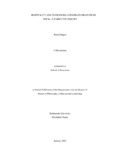
Please use this identifier to cite or link to this item:
https://hdl.handle.net/20.500.14301/537| Title: | Hospitality and Tourism Related Brain Drain from Nepal: A Narrative Inquiry. [Unpublished MPhil Disertation] |
| Authors: | Dangol, Purna |
| Citation: | Dangol,P.(2025).Hospitality and tourism related brain drain from Nepal: A narrative inquiry. |
| Issue Date: | Jan-2025 |
| Publisher: | Kathmandu University School of Education |
| School: | SOED |
| Department: | DOEL |
| Level: | M.Phil. |
| Program: | MPhil in Educational Leadership |
| Abstract: | The issue of brain drain is one of the threats faced by developing countries like Nepal. With the situation in mind, this dissertation explores the phenomenon of brain drain within Nepal's hospitality and tourism sector, focusing on the migration of skilled professionals abroad. The study aims to explore the reasons behind this trend, its implications for Nepal’s hospitality and tourism industry, and the strategies that stakeholders can adopt to address the issue. I applied narrative inquiry as a methodology to document and analyze the experiences of five educational leaders who have been involved in BHM Colleges with education, as well as supporting internships and consulting with their students. Through in-depth interviews and open-ended questions, I captured their stories, motivations, and challenges, as well as their perspectives on opportunities available locally and internationally. The research draws on theoretical frameworks, including the Push-Pull Migration Theory, Human Capital Theory and Transformational Leadership Theory, to examine the reasons and impact of contributing to brain drain. These frameworks provided a lens to critically assess the socioeconomic and professional motivations of individuals in the industry. Key insights reveal that limited career growth, inadequate remuneration, and lack of recognition in Nepal's hospitality sector are significant drivers of migration. The hospitality and tourism sectors are unequal and different in terms of local opportunities and those offered in international markets. Despite the challenges, the study underscores the potential for reforms within the sector to retain talent and skilled human resources by fostering better working conditions, competitive pay, and opportunities for professional development. This study provides valuable insights, such as creating job and income opportunities and focusing on the values of hospitality and tourism education and industry in the context of Nepal. These insights will help stakeholders like policymakers, educators, researchers, entrepreneurs, and civil society address the issue of brain drain and strengthen Nepal's hospitality and tourism industry for human resources. |
| URI: | https://hdl.handle.net/20.500.14301/537 |
| Appears in Collections: | Dissertation |
Files in This Item:
| File | Description | Size | Format | |
|---|---|---|---|---|
| PURNA DANGOL, FINAL DISSERTATION.pdf | 1.66 MB | Adobe PDF |  View/Open |
Items in DSpace are protected by copyright, with all rights reserved, unless otherwise indicated.